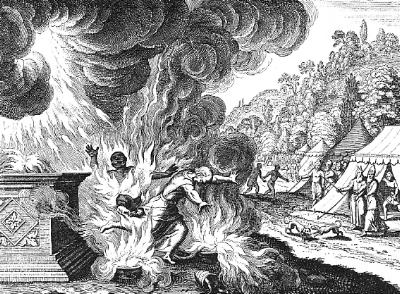Our Torah reading this week is the combined parshiyot of Acharei Mot and Kedoshim. Acharei Mot begins by recalling the tragic death of two of Aaron’s sons, which was recounted a few chapters prior: “And the Lord spoke to Moses after the death of Aaron’s two sons, when they drew near before the Lord, and they died.” (Vayikra 16:1) By doing so the Torah suggests that there is a connection between the teachings delivered here and the death of Nadav and Avihu.
In order to examine this connection, let us review the story of Nadav and Avihu. On the day of the commemoration of the Tabernacle, Aaron was commanded to perform certain rituals. His sons joined this service of their own accord and brought a fire, and placed incense on it. A fire then erupted and consumed them.
We tend to think of this story as yet another indication of God’s wrath: Nadav and Avihu disobeyed God and were therefore punished with death. However, the text does not say that God sent the flame. The term “from before God” is repeatedly used when describing their performance, and is again repeated in our portion’s summary of the event. They placed the fire before God, and before God the flame erupted, and they died before God.
Perhaps the fire consuming them was not an accident, but was their intention. The fire is described as a “foreign fire,” and at that time human sacrifices were a common use of fire by those surrounding the Jews. Nadav and Avihu may have been imitating this practice, which is completely foreign to Judaism, and thought that by doing so they were coming close to God. They were not able to make distinctions between God and man, so that the laws of God were of equal footing to the laws of man, and eventually they did not even see a difference between life and death.
The commandments in Acharei Mot prescribe the means of coming close to God. Specific places are designated to be entered by specific people on specific days with specific sacrifices. These laws designate barriers which seem arbitrary. From a physical perspective there is no difference between Yom Kippur and any other day, but our tradition provides us with a framework for seeing this day as different.
Once we establish that God is apart from us, we have the basis for recognizing that we as a people are different. This is what we are taught in the opening of our second parashah, Kedoshim, which begins: “And the Lord spoke to Moses, saying, Speak to the entire congregation of the children of Israel, and say to them, ‘You shall be holy, for I, the Lord, your God, am holy’ ”(Vayikra 19:1-2). We usually think of holy as meaning lofty, but the Hebrew word for holy, kadosh, means separate. Because our God is separate from the Gods of the nations that surround us, we are separate from the nations that surround us. Many of our laws are for the sake of differentiating us from the other nations, even though the difference between us and them may not be very noticeable. Those who lose the ability to differentiate between our nation and the surrounding nations are no longer part of the “congregation” to which Moses is speaking.
The laws of Kedoshim are a means of affirming the distinction between us and others. We are prohibited from mixing certain items and performing in various activities which other nations partake in. Again, these seemingly arbitrary distinctions provide us with the insight that differences are important. This assures a just society, as Jewish morality is based on this principle. The golden principle is included in our parashah: “You shall love your neighbor as yourself.” (Vayikra 19:18) Why couldn’t the Torah just say “love your neighbor”? Because in order to love someone else you must first recognize that there is a difference between you and the other. If you recognize the differences between yourself and your neighbor then you may learn to respect and honor him, and then you will naturally treat him fairly in business and not covet his possessions. The family structure which the Torah protects is based on making distinctions between people you may have relations with and people you may not.
The first step in learning to make distinctions is in recognizing that there is a God Who is distinct from humans. Rigid rules, with details that may seem arbitrary, are cast in order to reinforce our ability to make distinctions. The ability to make distinctions is the foundation of morality and keeps society in order. It is therefore in our best interest as individuals and as a community to constantly work on improving this capacity. By paying attention to the details, we come close to God and are reminded that the greatest distinction we can make is between life and death, and it is our responsibility to choose life.
____________
This article is part of Ha’Am’s Friday Taste of Torah column. Each week, a different UCLA community member will contribute some words of Jewish wisdom in preparation for Shabbat.

